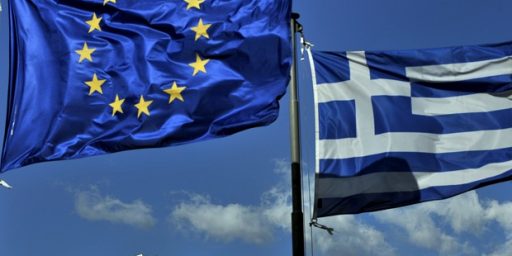Talks To Form Greek Coalition Government Collapse
The latest effort to form a government out of last Sunday’s confusing election in Greece seems to have failed:
ATHENS — Talks to form a new Greek government collapsed on Sunday, when the leader of a left-wing party that favors rejecting Greece’s loan agreement with foreign creditors again refused to join a unity coalition, making new elections almost a given.
President Karolos Papoulias of Greece was expected to meet with the leaders of several smaller parties on Sunday evening to try to persuade them to join a two-year unity government with the Socialists and center-right New Democracy aimed at enforcing the loan agreement — but with a possible renegotiation of some of its terms.
If Mr. Papoulias fails to convince leaders to form a coalition, he will call new elections in a month and appoint an interim government to lead Greece until then. The most likely date mentioned for new elections is June 17.
The political wrangling has again highlighted a clash between democracy and market forces. Greece’s political parties have been put in the position of needing to form a government that both reflects the will of the people — who largely voted against the loan agreement and would likely take to the streets if a new political formation did not listen — but that does not allow the country to renege on its commitments to Europe.
Concerned about the political instability, European leaders have warned that if Greece does not keep its promises, Europe will stop funding it, causing the country to default and exit the euro. But Alexis Tsipras, the leader of the Coalition of the Radical Left, or Syriza, has gained momentum precisely by calling Europe’s bluff.
On Sunday, he insisted that his party would not join a unity coalition with the Socialists and New Democracy, who signed Greece’s debt deal. Syriza would “not be complicit in their crimes,” he said. “Those that governed the past two years have not only failed to accept the message from the elections. They continue their policy of blackmail.”
“We call on all Greeks, not just leftists, to condemn once and for all the forces of the past and to realize that the only hope that is still alive in this country is to unify against blackmail and stop the continuation of this barbarism.”
Mr. Tsipras called on the conservatives and socialists to go ahead and form a coalition with Democratic Left, a moderate leftist party that splintered from Syriza in 2010 and that maintains resistance to the debt deal as a central plank in its political platform. “They have 168 seats, they have a majority, let them proceed,” the leftist leader said, referring to the aggregate of seats in Greece’s 300-seat Parliament garnered by the three parties in elections.
In a statement, the Democratic Left party called Mr. Tsipras’s suggestion “slander.” On Sunday afternoon, a party official said that Democratic Left would not change its position on the grounds that a government without Syriza would “lack legitimacy and could stoke social unrest.”
“The rage of Syriza is such that they would not allow such a government to stand even for a day,” the official said, predicting a wave of sit-ins and protests led by the left-wing party.
I don’t think we should expect Greek President’s final effort to form a government to be any more successful than all the others that have been tried for the past week, which means we’re headed for another round of elections. At that point, the Greek people will either have to choose between the agreement that was made, or reject it and deal with the consequences of being forced out of the Euro, which are likely to be devastating for the Greek economy.




Actually, they may not. If Greece goes a whole month with no action on this issue, it may be a moot point because the counterparties may decide they’re not longer interested in negotiating with the country.
@ Doug Mataconis
Leaving the EMU and reintroducing the drachma would dramatically improve Greece’s economic situation. The country would no longer need to borrow, nor would it be helpless against the financial drain of chronic trade deficits.
What are you basing your projection of “devastation” on, exactly?
I think the consequences of staying with the Euro, and the Austerity Forever doctrine that would be required for that, are likely to be just as bad, if not worse than leaving the Euro.
The Greeks are in for a significant restructuring of their economy — is it better for them to control the restructuring, or have it imposed on them by the EU? I’d think the former, especially if they default on the debt, and free up the chunk of their revenues that would go to servicing that debt. Let the Germans bail out their own bankers.
@Ben Wolf:
How’d you reach that conclusion? Even if Greece fully defaulted, they’d still have a deficit, both short term and (more and important) structurally that would require them to continue either continue cutting programs or borrowing.
Moreover, Greece is going to have to continue importing things like oil. Which puts them in another bind: oil producers are unlikely to accept payment and drachmas, but if Greece permits foreign trade to occur in Euros or Dollars, they’ve created a conduit for capital flight.
@Stormy Dragon: Nations sovereign in their own currencies do not borrow to fund spending. They direct their central banks to create new reserves and then forward those reserves to create deposits in recipients’ bank accounts. All Greece has to do is declare the drachma equal in value to the euro within Greece, then replace every single euro with the new currency. Oil might not be inexpensive, but Greece will find a seller which accepts drachmas somewhere. Why should Nigeria care if Greece defaults on debts to German banks?
@Ben Wolf:
It won’t. It will care about accepting payment in something that could lose considerable value with little notice (especially if, as you suggest the central bank is creating new reserves to cover continuing deficits) and which is useless for buying things from anyone other than Greece.
That only works for currency kept in Greek banks. The Greeks are, not suprisingly, converting their savings to hard currency in preparation for just such a move so the government also needs to keep those paper holdings from leaving the country.
@Stormy Dragon: Nigeria doesn’t keep the drachmas after accepting payment. They will convert them either into their domestic currency or, more likely, into hard currencies like the dollar or pound. Greece’s currency won’t be worth much on the FX markets, but they will npbe worth something. The real challenge will be for Greece to restrain itself from issuing too much money and generating inflation/monopolizing private sector resources.
@Ben Wolf:
How? The only way they can do that is if they can find someone who has dollars, pounds, etc. and wants to trade them for drachmas. No matter how many levels of indirection you add, at somepoint there has to be someone who actually wants drachmas, and it’s not clear that there will be any such people outside Greece in any significant number.